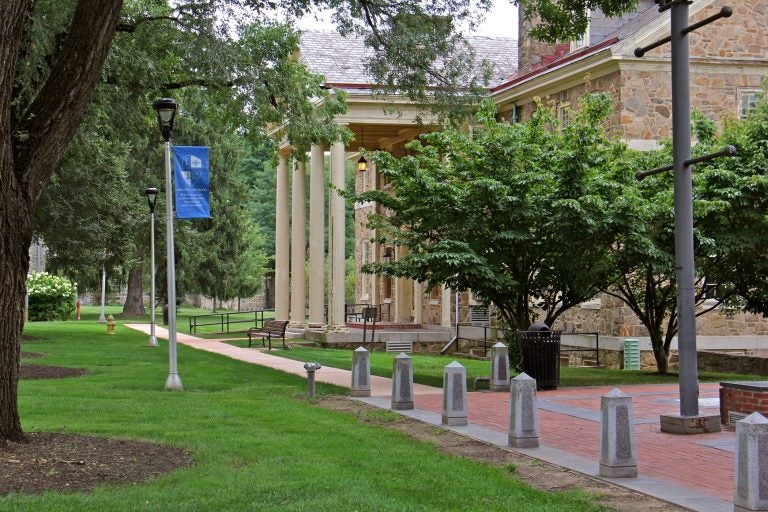Cheyney University is keeping its accreditation
Cheyney University will keep its accreditation, state leaders and university administrators announced in a letter to faculty, staff and students on Monday.

Browne Hall on the quad at Cheyney University. (Emma Lee/WHYY)
This article originally appeared on The Philadelphia Tribune.
—
The students and staff of Cheyney University have one more thing to be thankful for this holiday season — the reaffirmation of the school’s accreditation.
The Middle States Commission on Higher Education, the regional accrediting body, announced the action on Monday morning, just days after it held a closed-door hearing about the school’s status.
The commission “continues to recognize the significant progress that Cheyney University has made in coming back into compliance with the Commission’s standards of accreditation and requirements of affiliation,” said vice chairman James Sunser in a statement posted on the commission’s website. “As the non-compliance centered on the financial stability of the institution, the pledge by Pennsylvania Governor Tom Wolf to eliminate the institution’s debt to the Pennsylvania State System of Higher Education (PASSHE) and the Office of the Chancellor greatly improved the institution’s financial outlook.”
University President Aaron Walton said on Monday he was “very much encouraged” by the ruling, even with the conditions the commission has attached. Cheyney must provide reports in 2020 that show the resolution of its debts, a plan to repay the U.S. Department of Education money it owes, and the sustainability of its financial plans.
Walton said the work Cheyney has done — to raise money, balance its budget, improve academic standards, increase enrollment — is just beginning.
“Having the cloud of accreditation hanging over our heads for the last two years has made us focus on making sure these specific issues were addressed to the satisfaction of the accreditors,” he said. “We will continue to work toward excellence. We will not settle for mediocrity… There’s a lot of work left. We will celebrate the victory today and get back to work tomorrow.”
If Cheyney had lost its accreditation, it would not have been able to receive the state and federal financial aid many of its students need, which would have effectively shut down the nation’s oldest Black university.
The reaffirmation of Cheyney’s accreditation “is significant for the future of Cheyney University,” said Robert W. Bogle, chairman of Cheyney’s Council of Trustees and president and publisher of The Philadelphia Tribune.
“A lot of people made this happen. First, the president of the university, Aaron Walton; the governor of the commonwealth; the trustees; and the members of the university family. They all participated in the positive outcome. Cheyney is prepared to look to the future in a very positive way.”
Gov. Tom Wolf, state Sen. Vincent Hughes and state Rep. Jordan Harris, all of whom have worked with Cheyney and the Pennsylvania State System of Higher Education to help the university, praised the commission’s ruling.
Harris, calling Cheyney “the conscience of the African American community” and an “integral piece of the African American experience in higher education,” said it was “excellent news.”
Wolf said the ruling “will ensure that work continues so students from all backgrounds will have access to an equitable education that will prepare them for a successful future.”
“President Walton was forced to make difficult decisions, but he also raised significant funding and regained the confidence of the broader community to invest in Cheyney,” Hughes said. “I said publicly several months ago that I was betting on Aaron Walton. I am happy to say my bet is paying off.”
Middle States first put Cheyney on probation in 2015 over compliance issues related to its technology plan and weak finances. The commission extended Cheyney’s probation twice in the last four years, and had no mechanism in its rules to extend it any longer.
PASSHE Chanceller Daniel Greenstein said Cheyney “very likely” would lose its accreditation this year.
Around the same time Middle States put Cheyney on probation, the U.S. Department of Education also put Cheyney on a watchlist over administrative oversight issues related to the spending of $29.5 million in federal funds between 2011 and 2014. The department has continued to monitor Cheyney over the past few years.
Cheyney also had racked up $40.3 million in debt to the Pennsylvania State System of Higher Education.
The costs of running the university continued to increase as enrollment continued to decline.
The Council of Trustees in 2017 established a task force dedicated to saving Cheyney and named Walton as the president later that year.
Under Walton’s leadership, administrators worked to strengthen the school’s academic offerings and finances.
Earlier this year, with the help of Hughes and Wolf, Cheyney administrators and state officials worked out a deal for Cheyney’s debt: If Cheyney could balance its budget this year and for the next two years and repay $5.9 million, PASSHE will forgive the remaining $34.4 million. Cheyney balanced its budget this year for the first time since 2011.
Walton said getting to that point was a 2½-year process that required the university to eliminate $7.5 million to $8 million in recurring expenses.
The school saved on utilities expenses by narrowing the footprint of the campus, and demolishing several buildings that were still using utilities but not being used by students and staff, Walton said.
Cheyney administrators cut the number of majors the school offered from 19 to 15 to get them more in line with the size of the institution, Walton said. They eliminated staff positions and the school’s football team.
“I won’t bring back the football team,” Walton said. “It might be back someday. The school has to be financially stable into the future before it thinks about bringing back Division II sports.”
The school increased its academic standards and changed its approach to recruiting students, Walton said.
The school saw enrollment drop to a low of 469 students for the 2018-19 school year, but increase to 618 students for the 2019-20 school year. It was one of only two schools in the state system to see enrollment increase this year.
“We said we had to shrink to grow,” Walton said. “A lot of the students that were admitted were not academically prepared to be there and the school was not prepared to remediate the students that we had.”
Administrators now project that enrollment will increase to more than 800 students in the 2020-21 school year, and more than 1,000 in the 2021-22 school year.
Cheyney’s student retention rate is improving, administrators reported. Approximately 70% of the school’s freshman class from last year returned this year for their sophomore year.
Cheyney administrators also are working to develop public-private partnerships that provide education and employment opportunities for students. Some partnerships already are in place and more will be announced in the coming weeks, Walton said.
The university also is launching a fundraising campaign with the goal of raising $10 million by June 30.
WHYY is your source for fact-based, in-depth journalism and information. As a nonprofit organization, we rely on financial support from readers like you. Please give today.




